Are Food Sensitivity Tests Bogus? with David Stukus, MD
In this episode we're talking about:
- How food allergy testing works and why it doesn't apply to “sensitivities”
- The difference between IgG and IgE mediated reactions to food
- What to do if you suspect an intolerance but ruled out food allergy
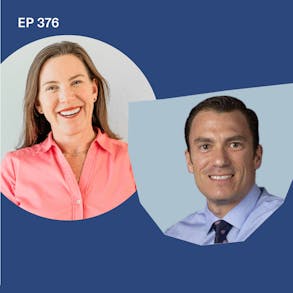
LISTEN TO THIS EPISODE
Episode Description
If you suspect your baby is sensitive to food, is it worth your time and money to explore food sensitivity testing? In this episode, noted pediatrician and allergist David Stukus, MD explains why and how food sensitivity tests do NOT work…and what (if anything) you should be testing for at all with regards to your baby’s ability to tolerate food.
About the Guest

- Dr. Stukus is board certified in allergy/immunology and pediatrics
- He’s the Director of the Food Allergy Treatment Center at Nationwide Children’s Hospital
- Dr. Stukus takes a food first approach in his work with families of children with food allergies

Links from this Episode
- Dr. Stukus on the Unbiased Science podcast: https://www.unbiasedscipod.com/episodes/food-allergy-the-real-dill-food-sensitivity-not-eggs-actly
- Baby-Led Weaning with Katie Ferraro program with the 100 First Foods™ Daily Meal Plan, join here: https://babyledweaning.co/program
- Baby-Led Weaning for Beginners free online workshop with 100 First Foods™ list to all attendees, register here: https://babyledweaning.co/baby-led-weaning-for-beginners
Other episodes related to this topic:
- Episode 227 - When Does the Food Allergy Prevention Window Close? with @allergykidsdoc David Stukus, MD
- Episode 125 - Why are False Positive Results in Food Allergy Testing so Common? with David Stukus, MD
- Episode 366 - Oral Immunotherapy: Helping Babies Become Less Reactive to Allergenic Foods with David Stukus, MD

Latest Episodes
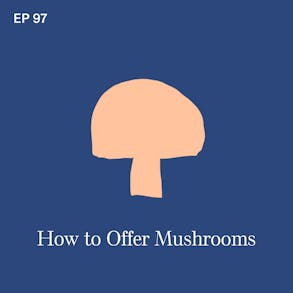
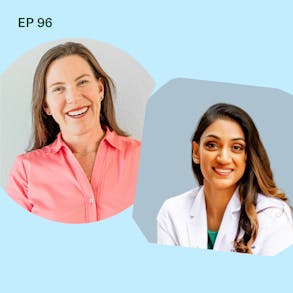
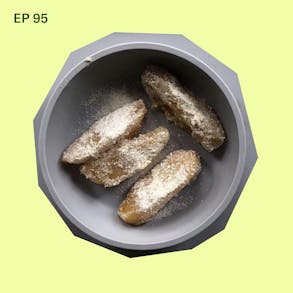
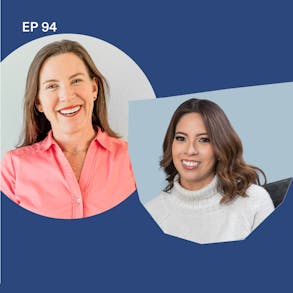

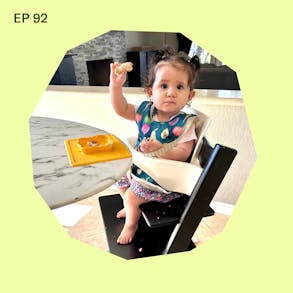
Katie Ferraro (1s):
I often get asked if I miss having babies. My youngest are twins and they're in kindergarten. Now is life changing you guys, no I do not miss having babies of my own. It's a lot of work. And. I. feel lucky 'cause I get to work with other people's babies every day in real life. So I, get my baby fix there. Right now I'm making all of my friend Carissa's son, baby Ezra's a hundred first foods. I'm following my own 100 First Foods daily meal plan that's inside of my program. It's called Baby-Led Weaning with Katie Ferraro. And we're on week seven now. So I making all the recipes for foods 31 to 35 and it's getting fun now 'cause it's at around the eight week mark. That's when babies will really kind of start jamming with solid foods. We're moving into phase two of the program. We're doing combination texture foods. The five new foods we're doing this week are melon, broccoli, rye, duck, and tofu.
Katie Ferraro (44s):
And I used to be so scared to make duck for babies, but I have this perfected this really easy whole roast duck recipe that seriously anyone can do. And most grocery stores have frozen duck in their free freezer aisle. So like it's weird but you can do it too. If. you want to follow along with that same hundred First Foods daily meal plan that we're doing with baby Ezra. It's all in the Baby-Led Weaning with Katie Ferraro program. I have the exact sequence of foods to feed, plus I've got this 100 First Foods content library so you can dip in and learn how to safely prepare all of the foods on the original a 100 First Foods list. 'cause I want your baby to eat a hundred foods before turning one as well. And you can follow that exact meal plan. Try all these new recipes too when you sign up at babyledweaning.co/program.
Katie Ferraro (1m 28s):
Again, that's babyledweaning.co/program and I hope to see you there. What are your thoughts on pumpkin? Are you a pumpkin person? I mean it's obviously everywhere this time of year, but your baby can get in on the pumpkin fun too. If you are looking for some ideas on how to make pumpkin safe for your baby, I've got some recipes you're gonna love. They're inside of my free feeding guide called Five Pumpkin Recipes for Baby-Led Weaning and you can download that at babyledweaning.co/resources. I hope you like these. The pumpkin curry recipe in there. It's one of my family's favorites and your baby's gonna love it too. Again, that's babyledweaning.co/resources for five pumpkin recipes your baby can eat for baby led weaning
David Stukus (2m 9s):
With IgG tests, what they're measuring is not validated, meaning it's never been actually shown that people with elevated IgG has a certain condition. It's never been shown that the same person with that condition has the same test results every time you take the test.
Katie Ferraro (2m 23s):
Hey there, I'm Katie Ferraro, Registered dietitian, college nutrition professor and mom of seven specializing in baby-led weaning here on the Baby-Led Weaning Made Easy podcast. I help you strip out all of the noise and nonsense about feeding, leaving you with the confidence and knowledge you need to give your baby a safe start to solid foods using baby-led weaning. What is up with food sensitivity tests? You see these all over the internet claiming to be able to test for over like 150 foods and chemicals that your child might react to in a single test. They feel super shady and they're definitely preying on parents' fears.
Katie Ferraro (3m 6s):
Actually heard Dr. David Stukus. My guest today on the Unbiased Science Podcast. Recently we had the gals from Unbiased Science Podcast on our show a while ago talking about dealing with misinformation in the science space. But then when I heard their episode with Dr. Stukus, I'm like, he is one of my favorite people on the planet to interview. And he was talking at great length about how food sensitivity tests are total hogwash. So he has a much more eloquent way of describing it. So I wanted to ask Dr. Stukus back on our podcast to break down food sensitivity tests with a particular emphasis on food sensitivities in children. Since that's obviously the appeal of our audience. Dr. Stukus is board certified in allergy and immunology as well as pediatrics. He's also the director of the Food Allergy Treatment Center at Nationwide Children's Hospital.
Katie Ferraro (3m 50s):
Dr. Stukus is a wealth of information on Instagram. He's @AllergyKidsDoc and Dr. Dave as he is known, he is coming out swinging on this one, which like, I literally love interviewing 'cause he starts describing how right outta the gate food sensitivities are a made up thing. How food sensitivity IgG tests aren't even a validated measurement tool. It's a very short and succinct conversation, but if you are considering exploring a food Sensitivity testing grout with your baby or your child or yourself for that matter, I hope you'll give this interview a thorough listen as Dr. David Stukus is bringing the science to refute the entirety of the food sensitivity testing world.
David Stukus (4m 29s):
Hi, thanks for having me.
Katie Ferraro (4m 31s):
I am so excited to chat. We're gonna talk about food sensitivity test. I think the whole idea of food allergy versus food sensitivity, it's really confusing to parents. Could you just tell us like real high level, how does a quote unquote sensitivity differ from a true food allergy?
David Stukus (4m 46s):
Well, sensitivity is made up, whereas allergy is, is an immune response to a food So. I led with that to grab people's attention. So a food allergy, it's really easy. So I, you form an immune reaction to a food, you form this allergy antibody called IgE. So every single time you eat that food, your body says you don't belong here and you have an allergenic reaction. It activates the allergy cells, typically occurs within minutes. Any combination of big grade G hives, swelling, vomiting, wheezing, anaphylaxis, that's how food allergy presents this term. Food sensitivity has been applied to a whole range of symptoms that has never been actually, you know, shown to actually be true. There is no consensus medical definition, nor are there existing diagnostic criteria to diagnose food sensitivity.
David Stukus (5m 28s):
That's really important because without those clear criteria, anybody's, you know, free to do whatever they want to use that term. So that's why I say it's kind of made up because you know, there are people out there that have symptoms when they eat foods and intolerances occur and that's more difficulty with digestion. But this term sensitivity has just exploded as a marketing term in recent years.
Katie Ferraro (5m 47s):
You've previously been on our podcast talking about food allergy testing and how that works and why there are so many false positive results. And so there's a previous episode, you guys, it's called Why are False Positive Results in Food Allergy Testing So Common With Dr. Stukus and I'll link to that in the Shownotes if you wanna learn more about that. But I wanna ask you what food sensitivity tests are then if they're not food allergy tests, how do they purport to work if sensitivity is a made up thing?
David Stukus (6m 11s):
Yeah, so this is like Pseudoscience 101. So food sensitivity tests measure IgG antibody, which is a memory antibody. IgE is involved in the allergenic response. As you mentioned, there's lots of False positives. More people are sensitized than actually Allergenic with IgG tests. What they're measuring is not validated, meaning it's never been actually shown that, you know, people with elevated IgG has a certain condition. It's never been shown that the same person with that condition has the same test results every time you take the test. And it's never been shown to show a difference of people with flu sensitivity showing one result compared to those who don't have flu sensitivity with a different result. So those are three very basic, you know, things that need to be met for any test to be validated.
David Stukus (6m 51s):
And these tests have not ever met those in any degree. Also, there's no normal values that we know about. What's a normal response of IgG? Here's the best analogy I can present. We know And, we talked about in another podcast, Oral Immunotherapy. When you desensitize somebody to what they're allergenic to, their IgE levels start to go down over time. As they lose the allergy, their IgG levels go up at the same time because they're now protected from that food. IgG means protection and tolerance, not sensitivity or allergy. So there's really no medical basis to use these measurements of these tests to diagnose anything. We also know, as you mentioned, IgE, legitimate food allergy tests, allergy IgE tests are not screening tests.
David Stukus (7m 33s):
You can't just test for everything and see what comes back because you get a lot, a lot of False positives. So if IgE legitimate tests aren't screening tests, why on earth are people using IgG tests as screening tests? It makes no sense. Hey,
Katie Ferraro (7m 45s):
We're gonna take a quick break, but I'll be right back.
Katie Ferraro (8m 53s):
What about food intolerance testing, though we're definitely in our program seeing an uptick in parents asking lots of questions about food intolerance. Okay, I've ruled out food Allergy, so now I wanna go down the path of this is a food intolerance. And then there's all these, you know, targeted ads that they get for babies as young as like under 12 months of age. Is there any legitimacy to a food intolerance test? Well,
David Stukus (9m 10s):
The only ones that I'm aware of are, are typically done in the hospital setting and you know, you can do breath analysis for some of these metabolites and things like that to diagnose lactose intolerance and things along those lines. But that's all I'm aware of. Really the best test is, is the history. So I intolerances are gonna cause difficulty with digestion. And, we often will, will recommend elimination diets. So you, you need to come to me with the foods of concern. It's not if you have vague symptoms and you're not sure if, if food is causing it, it's probably not caused by food. There's probably other rational explanations for it. There are, these are common symptoms that occur due to other common conditions, but if you really think it's a specific food, you need to take it outta the diet. See if symptoms improve completely. If they do improve completely after a period of two to three weeks, put it back in the diet to see if symptoms come back again.
David Stukus (9m 53s):
That's really the best way to diagnose it.
Katie Ferraro (9m 55s):
And food sensitivity tests, that was kinda looking online preparation for this episode. The ones that are marketed to parents of children, they seem to cost somewhere around 150 to $200 online. They're all administered at home. Are any of these regulated by like federal bodies or institution like, I don't know if it's just me and my algorithm, but they're all over the place now. I feel like,
David Stukus (10m 12s):
Oh no, they're, you can, you don't have to leave your house. You can get delivered from DoorDash. So I'm not aware of any FDA regulations on them. I don't know why there isn't more oversight, but you know, this isn't the only unvalidated test that people can can obtain. This is all over the place. There's now direct to consumer IgG tests as well, which is a real problem because as I just mentioned, they're not screening tests and all of them put the disclaimer of this isn't medical advice and whatever, but once you have that test done and you see the result, you can't unsee those results and they impact you in many ways.
Katie Ferraro (10m 43s):
I saw one ad that claimed to test over 150 foods and chemicals that your child might react to in a single test. And the ad copy, I mean just textbook totally preying on parents' fears like food sensitivities are responsible for your baby's sleep disruptions and eczema and colic in reflux, you know, all the baby stuff. Like why are these tests allowed to proliferate if they're not widely accepted by the medical community? That's
David Stukus (11m 3s):
A great question. I don't know. And you know, it's interesting, there are some in the fringe medical community, and I'll use my air quotes here, that aren't true board certified physicians or you know, other, other legitimate degrees and they're actually recommending these tests. A lot of times these are coming from natural paths and you know, these holistic practitioners and sometimes chiropractors and stuff like that. But yeah, so they add that air of legitimacy to them when it shouldn't be there. It's really unfortunate.
Katie Ferraro (11m 28s):
What about parents who do suspect that their baby is sensitive or intolerant to a certain food? You know, the last thing we wanna see is, I agree with elimination diets under a supervised medical practice, but like a lot of parents are just gonna cut out, I'm never gonna eat soy, I'm never doing dairy again. And now you're eliminating huge swaths of foods with very valuable nutrition. What should parents do if they suspect an intolerance? Since we know sensitivities are made up,
David Stukus (11m 50s):
Hopefully they talk to their child's pediatrician. You know, that's the best place because there, there are often very good explanations for those symptoms that, that you're observing that may not be due to specific foods. I always try to figure out is this a food issue or is this a you issue? And if it's due to specific foods, we do clarify, is this allergy or intolerance And? we have specific steps to, in order to do that, in ways to manage that. If it's a you issue, maybe this is something like reflux or, or colic or normal sort of infant behavior. The way I think about it, and this may be a very simplistic view, but this is what we see as pediatricians. Your baby is in a very, very safe loving, amazing environment and your warm, calm uterus from seven to nine months and then they are thrust into the very scary, harsh world where now they need to eat and swallow on their own.
David Stukus (12m 35s):
They need to try to stay warm. It's really disruptive. So I think we need to give them at least seven to nine months to kind of acclimate. And as they acclimate, there's a huge range of of behaviors that they'll demonstrate. They're gonna cry, they're gonna have difficulty, you know, swallowing and learning how to eat. Their digestion's gonna be impacted by the different types of foods that they're eating. So there's a lot of normal variation that we see that just self resolves and just magically gets better as they mature when they get used to living in our crazy world.
Katie Ferraro (13m 1s):
Hey, we're gonna take a quick break, but I'll be right back.
Katie Ferraro (14m 16s):
Well, thank you so much for talking about these tests. I know it's sometimes hard to say this is bogus, but at the end of the day, what term would you use to describe food sensitivity tests? Like if you had to sum it all up in one adjective
David Stukus (14m 29s):
Made up. Okay. No, it really honestly, and for anybody who disagrees, you know, go find the evidence. It's really that easy. Carl Sagan, one of my favorite quotes, extraordinary claims require extraordinary evidence. It should be that simple. There should be mountains of evidence supporting these tests if they're legitimate, And, I have not found it.
Katie Ferraro (14m 47s):
Well, thank you again, Dr. Stukus. It's always great chatting with you.
David Stukus (14m 50s):
Likewise. Nice to see you. Well.
Katie Ferraro (14m 52s):
Well, I hope you guys enjoyed that interview with Dr. Stukus. I always appreciate the opportunity to chat with him and pick his brain. He does not mince words. I love that. He cuts right to the chase, tells you about the science. He's got a mix of research and that practitioner expertise sprinkled in. I'm gonna share more of Dr. Stukus' resources on the Shownotes for this episode, which you can find at blwpodcast.com. A special thank you to our partners at AirWave Media. If you guys like podcasts that feature food and science and using your brain, then AirWave Media has some great podcasts for you to listen to. We are online at blwpodcast.com and thank you so much for listening. I'll see you next time.
Katie Ferraro (15m 36s):
If you're interested in doing baby led weaning, but you're not exactly sure, like what does that mean? What does it look like? Where do I start? My online program called Baby-Led Weaning with Katie ferraro has everything you need to give your baby a safe start to solid foods and get them to eat over a hundred foods before they turn one, whether you're terrified of choking or maybe you've started but you feel like you're feeding your baby the same foods over and over 'cause you don't know what to feed next, or you're looking for guidance on how to prepare foods safely for your baby's age and stage. My program has exactly what you need. There's five hours of concise self-paced video training. You can knock this thing out during nap time this week. You also get access to my hundred first foods content library so you can see and learn exactly how to prep all of the a hundred foods as well as my original a hundred days meal plan.
Katie Ferraro (16m 19s):
I've been refining this program for the last seven years. Just today, a mom wrote to me and told me that the a hundred days meal plan has been a quote game changer for her busy lifestyle. When you join the program, you also get access to over a hundred phase two combination food recipes. So you're gonna try out the trickier textures, push your baby's palate. And what's cool about these recipes is your whole family will enjoy them. So everything you need to give your baby a safe start to solid foods is inside of the program. It's created by me, a Registered dietitian who specializes in infant feeding. If you're tired of hunting and pecking around the internet trying to piece this stuff together on your own, I put it all in one convenient place for you. I invite you to check out the Baby-Led Weaning with Katie Ferraro Program that's at babyledweaning.co. Again, that website is babyledweaning.co and click on 'Program' to learn more.

The Program Baby-Led Weaning with Katie Ferraro
A step-by-step digital program for starting solid foods safely and navigating the original 100 FIRST FOODS™ meal plan with baby-led weaning.
 EXPERT-LED, PROVEN APPROACH TO EATING REAL FOOD
EXPERT-LED, PROVEN APPROACH TO EATING REAL FOOD CONCISE VIDEO TRAININGS TO MASTER BABY-LED WEANING
CONCISE VIDEO TRAININGS TO MASTER BABY-LED WEANING 100 FIRST FOODS DAILY MEAL PLAN WITH FOOD PREP VIDEOS
100 FIRST FOODS DAILY MEAL PLAN WITH FOOD PREP VIDEOS
Baby-Led Weaning for Beginners Free Workshop
Is your baby ready to start solid foods, but you’re not sure where to start? Get ready to give your baby a solid foundation to a lifetime of loving real food…even if you’re feeling overwhelmed or confused about this next stage of infant feeding.
Get baby-led weaning recipes and tips delivered to your email inbox.

